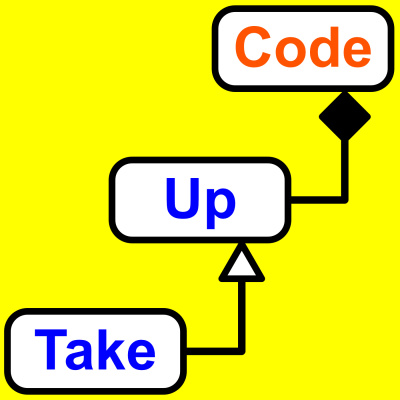Sinopsis
Take Up Code is a podcast that explains computer programming topics through fun and engaging examples that you can relate to. The guided format allows you to gain valuable understanding of topics that will reinforce your studies, allow you to train new skills that you can apply on your job, and change your thinking about what it takes to become a professional programmer. The episodes are as short as possible so you can squeeze them into your daily routine.
Episodios
-
113: Data Types: Arrays.
25/05/2016 Duración: 13minYou will often need multiple variables of the same type and while you can sometimes just create separate variables with their own names, what if you do not know ahead of time how many will be needed?
-
112: Data Types: Floats.
24/05/2016 Duración: 10minIf you want to work with fractional values instead of just whole numbers, then floating point types are usually a good choice. They are different enough from ints that you need to understand how to use them.
-
111: Data Types: Enums.
23/05/2016 Duración: 10minWhat would you rather see? 1, 2, 3, or red, green, blue? Enums allow you to give meaningful names to values. Seems simple, right? It is, except for a few things you should be aware of.
-
QA Friday 2016-May-20
20/05/2016 Duración: 08minI met a person recently who has a college degree in computer science. He works at a local pizza shop. The question this week is not really a question but my thoughts on the situation. What went wrong? Or did anything go wrong?
-
110: Data Types: Void And Bool.
19/05/2016 Duración: 12minVoid and bool are simple types that you can use with very little explanation. There are a few details that you should be aware of though.
-
109: Data Types: Ints Part 2.
18/05/2016 Duración: 16minYou will probably have one or more ints in almost every method and class you write. They are everywhere so you really should know how to use them.
-
108: Data Types: Ints Part 1.
17/05/2016 Duración: 12minYou will probably have one or more ints in almost every method and class you write. They are everywhere so you really should know how to use them.
-
107: Data Types: Chars And Bytes.
16/05/2016 Duración: 10minChars and bytes form some of the most basic data types available. But what are they really? And what can you do with them?
-
QA Friday 2016-May-13
13/05/2016 Duración: 05minHow do I use my foundational skills in programming to start making useful software?
-
106: Multithreading. Call Me Back Please.
12/05/2016 Duración: 11minCallback methods can also be either synchronous or asynchronous and add a whole new dimension to how you can approach problems.
-
105: Multithreading. Sync vs. Async.
11/05/2016 Duración: 09minWhat are synchronous and asynchronous methods and how do you use them?
-
104: Multithreading. Singleton Mistakes.
10/05/2016 Duración: 11minThere is a big problem with Singletons especially in the C++ language. It is not obvious how to get them to work with multiple threads. You want one instance in your entire application and how do you handle the race condition when multiple threads ask for the instance at the same time?
-
103: Multithreading. Volatile.
09/05/2016 Duración: 10minVolatile is a keyword that allows you to turn off certain optimizations. Unfortunately, it is also used incorrectly many times as a way to synchronize threads.
-
-
102: Multithreading. Up And Down.
05/05/2016 Duración: 09minWhat if you just want to limit how many things you can have or can be done? This episode will explain another side of the semaphore sometimes called a counting semaphore.
-
101: Multithreading. Signal And Wait.
04/05/2016 Duración: 13minSemaphores are often confused and characterized as just a more general form of a mutex. There are actually some big differences though.
-
100: Multithreading. Master The Lock.
03/05/2016 Duración: 13minThis episode dives deep into locks. How do they work? And then explains how you can use this to implement a reader-writer lock.
-
99: Multithreading. Cache Lines.
02/05/2016 Duración: 09minIf you are not careful, you can cause a processor to come to an immediate and full stop while it waits for data to move around in memory. That is probably not the performance boost you were looking for.
-
QA Friday 2016-Apr-29
29/04/2016 Duración: 06minDo you get more value out of articles, videos, or podcasts?
-
98: Multithreading. The Great Divide.
28/04/2016 Duración: 08minHow do you assign work to threads? This episode explains several ways you can think about this and when to use them.

































